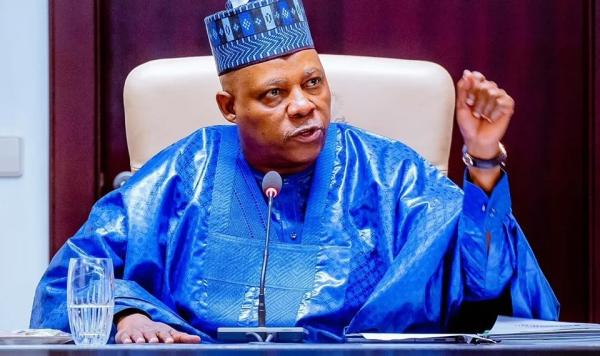Headlines
Shettima Summons Lokpobiri, Kyari, and Ribadu Over Petrol Price Hike

Vice President Shettima has summoned Lokpobiri, Kyari, and Ribadu for discussions regarding the recent petrol price hike, as the government seeks solutions to address public concerns.
The Minister of State for Petroleum Resources (Oil), Senator Heineken Lokpobiri, and Group Managing Director of Nigerian National Petroleum Company Limited (NNPCL), Mele Kyari have been summoned by Vice President Kashim Shettima.
The Presidential Villa also called in Nuhu Ribadu, the National Security Adviser on Thursday to discuss the recent surge of Premium Motor Spirit (PMS) prices.
In his office at the State House in Abuja, the trio is meeting with the Vice President.
Amidst the ongoing fuel scarcity and crisis in the country, NNPCL hiked up petrol pump prices on Tuesday to ₦855 – ₦897 per litre depending on location from its previous rate of ₦568.
Fuel was already sold at higher prices than those offered by the NNPCL by private suppliers, with some charging 1,200 naira per litre as on Wednesday.
NNPC admitted to facing financial difficulties in sustaining fuel supplies, as the cost hike arrived just 24 hours later.
On Wednesday, several privately-owned petrol stations in Lagos, Abuja and Kano City were shut down. Massive queues of vehicles accumulated overnight outside NNPC fuel stations.
Deception
Amidst the hardship and economic reality faced by citizens, numerous Nigerians and groups have expressed their disapproval of NNPCL’s fuel price hike.
The Nigerian Labour Congress (NLC), the Trade Union Congress (TUC), the Nigerian Bar Association (NBA) and the Nigerian Medical Association (NMA) are among those who contend that a rise in prices would only add to the suffering of Nigerians.
The President of the NLC, Joe Ajaero, denounced the increase in fuel prices and alleged that the government had betrayed labor advocacy.
He insisted on an immediate decrease in the price of petrol.
According to Ajaero, “The latest pump price increase of PMS across the country must be reversed immediately and all individuals imprisoned or charged for being involved in the recent protests should be released.”
We demand an end to policies that cause hunger and a lack of security. We also call for the government to stop its culture of terror, fear-mongering, and deceit. Our actions are driven by our love for our country and the imperative to protect its autonomy, unity, as well as improve the wellbeing of all citizens.
READ ALSO: Labour Unions Demand Reversal of Petrol Price Hike, Prepare for Crucial Talks
Stop arresting and detaining citizens for false accusations, reduce the electricity tariff hike by 250%, and cease taking over the responsibilities of the Ministry of Labour and Employment.
Hope Renewed
Despite being a significant oil producer, Nigeria lacks adequate refining capacity and frequently experiences fuel shortages resulting in dependency on imported petrol.
The decision to increase fuel prices was justified by Bayo Onanuga, a presidential aide, who claimed that the NNPCL was facing difficulties in meeting its obligations towards federal accounts.
On X, he expressed that the inception of petrol production at Africa’s largest Dangote refinery for local consumption would offer economic solace.
Onanuga stated that there are no simple solutions and emphasized the necessity of taking action to ensure NNPC’s survival, maintain government operations, and sustain petrol production.
Tinubu pledged an agenda labeled as “Renewed Hope” upon taking office 18 months ago. The implementation of reforms, which officials assert will ultimately stabilize the economy and foster investment, was assured by him.
He eliminated a costly fuel subsidy that maintained artificially low petrol prices, which had been costing the government billions of dollars each year. Additionally, he implemented currency liberalisation for the naira.
Despite repeated appeals from officials to be patient for the reforms’ impacts, inflation peaked at 34 percent in June- its highest level in three decades.
Despite a slight reduction in consumer prices during July, food inflation stubbornly persisted at 39.5 percent.
One of the measures introduced to help offset living costs was more than doubling the minimum wage for public sector workers to 70,000 naira per month by the government in July.
However, the effect of the recent fuel hike was already evident on Wednesday as transportation and food costs started to rise.
